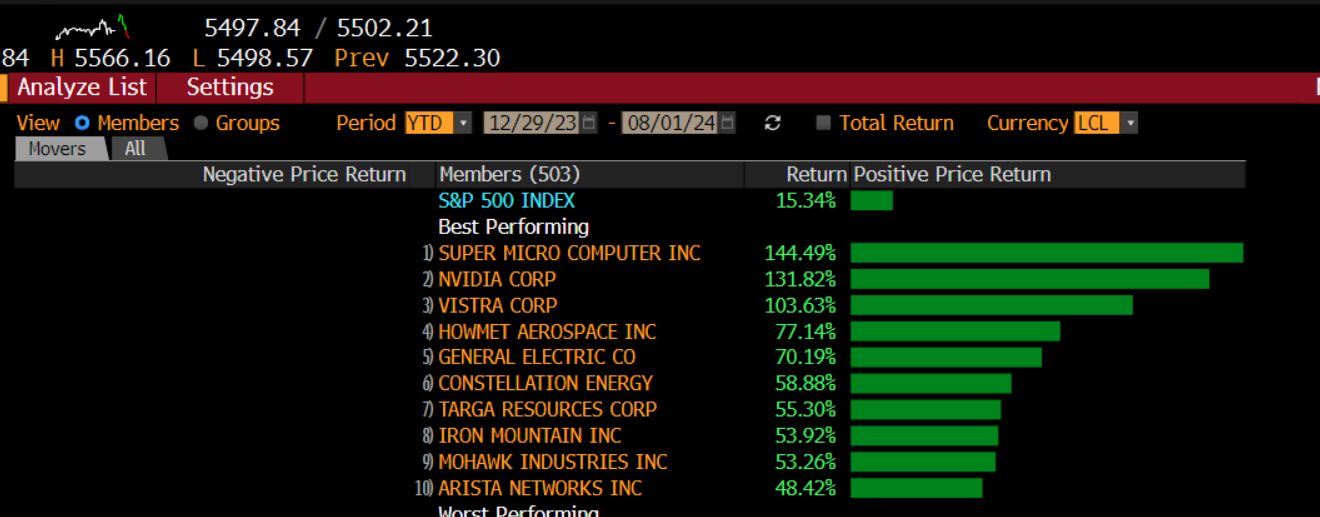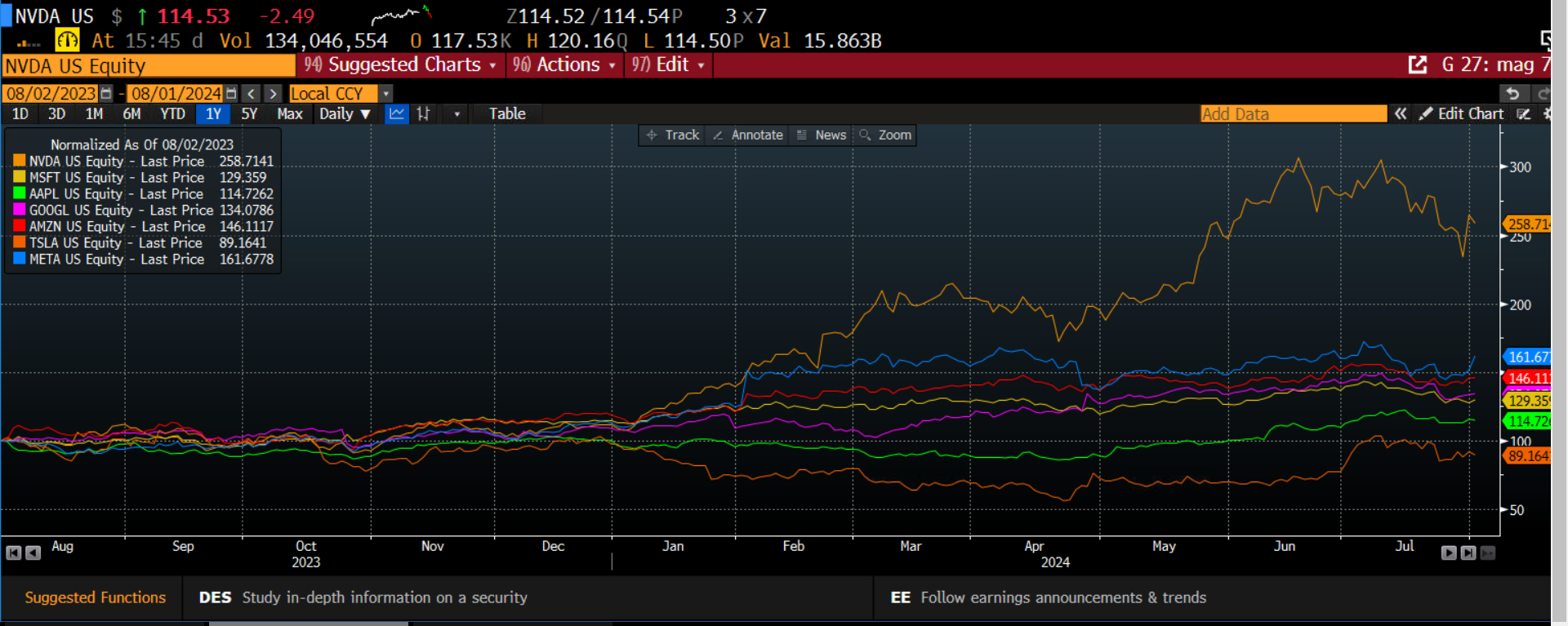The Artificial Intelligence trade has been a huge market theme for most of the last 18 months, and big gains for the likes of Nvidia have been a key driver of US stock markets. However, has it reached a tipping point? As we move through the second half of the year, the AI trade can no longer be relied on to keep stock markets moving higher. Added to this, the Q2 earnings season also shows us that investors are becoming more demanding about the financial impact of Artificial intelligence investments.
The Artificial Intelligence trade has been a huge market theme for most of the last 18 months, and big gains for the likes of Nvidia have been a key driver of US stock markets. However, has it reached a tipping point? As we move through the second half of the year, the AI trade can no longer be relied on to keep stock markets moving higher. Added to this, the Q2 earnings season also shows us that investors are becoming more demanding about the financial impact of Artificial intelligence investments.
AI: Many trades, one theme
In truth, the AI trade was never one trade. You can split the trade into three parts. First there are the hardware makers of the semiconductors who make the chips, like Nvidia, Google (Alphabet) who make chips that are used for their purpose-built AI accelerators that are used to power their cloud functionality, Advanced Micro Devices, Amazon and Intel. Nvidia is the leader in this space and has the highest market cap of all the main AI chip makers. It dominates the GPU market and the high-performance, high speed AI chip market.
The second AI trade is the companies that are embedding their products with AI and selling them on to consumers. Nearly all sectors of the stock market are using AI for practical tasks in their business, for example, healthcare, insurance, banking, retail and marketing. Companies like Microsoft, Amazon and Google are providing the services and products that allow these sectors to easily harness the power of AI for their businesses.
The third trade is the overall US tech trade. The Nasdaq composite index is one of the best performing indices in the market right now and is higher by 17% YTD. This is another sign that the AI trade is having a positive impact on the overall tech-based stock market.
Chip makers are kings of the AI trade
When it comes to the best performers in the AI trade, the standout top performers are the chip makers. The producers of semiconductors have been the top performers on the S&P 500 so far this year. Nvidia is the second-best performing stock on the S&P 500, behind the new kid on the block, Super Micro Computers, who also provide servers and architecture to help the cloud, the metaverse, and AI, as you can see in the chart below. The semiconductors sector is the best performing segment of the S&P 500 so far this year and is up more than 66%.
Chart 1: The top performers on the S&P 500 so far in 2024
 Source: XTB and Bloomberg
Source: XTB and Bloomberg
Past performance is not a reliable indicator of future results
Within the world’s largest tech stocks, Nvidia is by some distance the best performer within the Magnificent 7 over the past 12 months, as you can see below.
Chart 2: Magnificent 7
 Source: Bloomberg and XTB
Source: Bloomberg and XTB
Past performance is not a reliable indicator of future results
The early days of the AI trade
There is a reason why Nvidia and other chip makers are outperforming the tech giants. They are at the top of the pipeline when it comes to creating AI for the global economy. The chips and servers that they produce are the vital components of the AI future that the AI trade is based on. They create the building blocks that the large language models and other AI tools are built with. The dominance of the AI chip makers over other parts of the tech sector in recent months, shows how early we are in the AI trade. Once the building blocks have been formed, then the enablers of AI tech – Microsoft, Google, Amazon and Apple – may play catch up with Nvidia and co.
Investors start to scrutinise AI investments
The Q2 2024 earnings season also put a new focus on how much revenue is being generated by AI investments. Due to this, the reaction to the latest earnings announcements have been uneven. Meta’s results were better than expected. Growth surged, with revenues coming in at $39.07bn, vs. $38.33bn expected. Added to this, net income was $13.46bn, better than the $12.81bn expected. This surge in growth was fuelled by a 22% increase YoY in advertising revenue. Reality labs, one of Meta’s biggest AI investments, saw revenues grow by 28% YoY. The company upgraded their capex figures, and they also gave strong forward guidance, with Q3 revenues expected to be in the range of $38.5bn to $41bn. Meta’s share price surged on these earnings, and the share price rose by 7% in the aftermath of the release. This suggests that investors are willing to overlook increased capital expenditure, as long as revenue growth remains strong.
This contrasts with Microsoft. The reaction to its earnings report for Q2 was more lacklustre. Microsoft may have delivered hefty revenues for Q2 at $64.73bn, vs. estimates of $64.52bn, however, the breakdown of these revenues concerned investors and sent the share price tumbling more than 5 % in the aftermath of the earnings release.
The ‘AI’ stars at Microsoft are the cloud service generators and they failed to deliver stand out results for Q2. Cloud services generated revenues of $36.8bn, a touch less than the $36.84bn expected. Intelligent cloud services generated revenues of $28.52bn vs. estimates of $28.72bn. Is the market expecting too much from Microsoft and co? Probably, these are still amazing revenues and AI is obviously impacting Microsoft’s revenue streams. However, with a 12-month forward P/E ratio of more than 32 times earnings, the market is getting tired of paying up for AI. Microsoft disclosed that AI had boosted its Azure cloud services revenues by 8 points, total revenue growth was up 29%, or 30% on a constant currency basis. This compares with a 7-point increase in the prior quarter, however overall revenue growth was slower in this quarter relative to the prior period, where Azure revenues grew by 31%. The fact that Microsoft and co. feel the need to break out the impact that AI is having on revenue is interesting – they must justify their investment in AI to try and keep investors on board. Capex spend was also bigger than expected last quarter, at $13.87bn vs. $13.27bn, which was not welcomed by the market.
Nvidia benefits from increased Capex spend
Increased capex spend may be bad news for Microsoft, but it is good news for Nvidia, its stock price rose more than 10% in the days after Microsoft released their results. Since Microsoft makes up approx. 20% of demand for Nvidia’s highest quality AI chips, increasing capex spend at Microsoft is good news for Nvidia’s bottom line.
Why politics is a factor that can influence the AI trade
The other factor investors need to consider when trading AI stocks is politics. The US government has implemented restrictions on semiconductor exports from America to China and elsewhere. So far this has not had too much impact on the chip makers’ revenues, however, if President Trump wins the election in November, then we could see more egregious trade barriers put in place, which could be a threat. At the end of July, the US government suggested that restrictions on chip exports and the exports of chip making equipment could be lifted, which triggered a major rally in these shares. This is a sign that it’s not only macro factors that are driving the semiconductor stocks, politics and restrictions are also key drivers that investors need to be aware of.
The AI trade has dominated financial markets this year and is one of the key drivers of US blue chip stock markets so far in 2024. However, as you can see, we are still in the early stages of AI adoption, with the infrastructure built out in the first phase. This is benefiting the chip makers more than companies like Microsoft who are embedding AI into their products to sell to consumers. The implementation phase – where AI features are rolled out – could be the next big phase of growth for the AI trade, and this is where the likes of Microsoft etc. could see their stocks play catch up. However, we are not at this stage yet.
Overall, the AI trade is here to stay, although as we move into the future, the winners of the AI trade could change.

Utilities, Homebuilders, Healthcare & Tech firms: Stocks To Look Out For ahead of the UK General Election

Investing during a crisis: Strategies and Tips

US Presidential Election 2024: Kamala Harris vs Donald Trump. Which candidate is better for stock markets?
This content has been created by XTB S.A. This service is provided by XTB S.A., with its registered office in Warsaw, at Prosta 67, 00-838 Warsaw, Poland, entered in the register of entrepreneurs of the National Court Register (Krajowy Rejestr Sądowy) conducted by District Court for the Capital City of Warsaw, XII Commercial Division of the National Court Register under KRS number 0000217580, REGON number 015803782 and Tax Identification Number (NIP) 527-24-43-955, with the fully paid up share capital in the amount of PLN 5.869.181,75. XTB S.A. conducts brokerage activities on the basis of the license granted by Polish Securities and Exchange Commission on 8th November 2005 No. DDM-M-4021-57-1/2005 and is supervised by Polish Supervision Authority.


